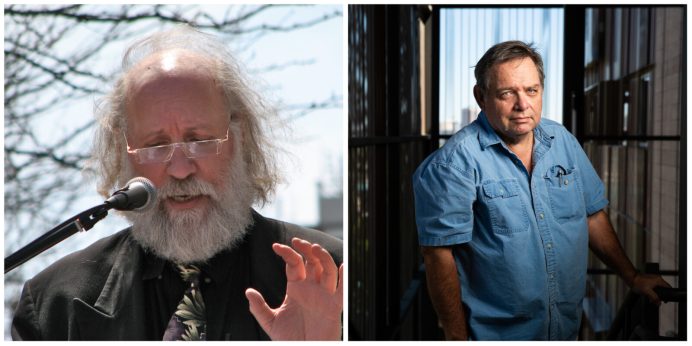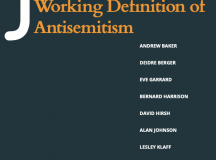The MLA Executive Council have hit a new low by acting in secret, without notice and without membership approval, to conflate support for the IHRA definition of antisemitism with American racism. Cary Nelson, Professor Emeritus at the University of Illinois at Urbana-Champaign, and Joe Lockard, associate professor of English at Arizona State University, set out the facts and call on MLA members to reform the organisation.
For many years, the Modern Language Association’s members voted overwhelmingly to reject resolutions condemning Israel. Now the MLA’s main governing body, the Executive Council, has joined with its Committee on Academic Freedom to endorse anti-Zionist complaints about the most widely adopted definition of contemporary antisemitism. Realising that the members would likely vote down their statement, the members of these two committees acted in secret, without notice and without membership approval.
We are both long-time MLA members, one of us since 1969, the other since the early 1990s. One, Cary Nelson, is a former member of the MLA Executive Council, as well as a former president and current lifetime member of the AAUP. We are deeply troubled by the MLA’s decision to do an end run around the membership and make a flawed understanding of antisemitism and Zionism part of the MLA’s public profile.
The definition at issue is the one adopted by the International Holocaust Remembrance Alliance (IHRA) in 2016. In addition to misrepresenting the IHRA definition, they have joined the national American Association of University Professors (AAUP) in slandering those who find the IHRA definition’s examples helpful in understanding the contemporary world. Worse still, they link the IHRA definition with international racism: ‘Proponents of overly broad definitions of antisemitism and proponents of eliminating teaching about the history of racial and other violence share a desire to mobilise the government to enforce particular, emaciated accounts of history, harm, and injury.’ The AAUP and the MLA have conflated legislative efforts to block discussions of racism with a statement designed to do exactly the opposite: encourage discussions of antisemitism. Though the MLA leadership was not honest enough to complete the implicit equation, the intent is clear — to invoke the antisemitic claim that ‘Zionism is racism’.
To be clear: racism is the founding wound of US history and must be taught forthrightly throughout the educational system. Structural racism remains a potent force in many American institutions. We reject efforts to block the need to confront that history. Indeed, anti-racism has been foundational in our teaching and scholarship.
But the AAUP/MLA decision to equate such efforts with nuanced understanding of antisemitism and anti-Zionism is deplorable. The carefully worded IHRA examples do not represent any effort to suppress the complexities of Israeli history or to enforce an overly broad definition of antisemitism. It is unfair and invidious to conflate support for the IHRA with American racism.
So how did the MLA find itself doing just that? Some history may help people understand the evolution of MLA politics.
For a decade — from 2007-2017 — annual meetings of the Modern Language Association were convulsed by battles over whether the professional organisation representing literature and foreign language faculty members should condemn the Jewish state and call for an academic boycott of Israeli universities. Following a pattern that played out in other disciplinary groups as well, opponents of the Jewish state concentrated their organising efforts at winning seats on the decision-making body that voted on policy proposals, the Delegate Assembly, before submitting them to the whole membership for a vote. Anti-Zionism was their one and only cause, but few if any mentioned it in their campaign statements. Instead, they pledged their commitment to bread-and-butter issues, like raising the salaries of part-time faculty, which would meet with wide approval. Then, if they won election, they would promptly reveal themselves as single-issue advocates.
The passionate debates at the annual meetings could take hours, and they were not inspiring models of faculty erudition. Like a number of other groups, the organisation’s professional staff was overall quietly opposed to academic boycotts, partly because they did not want to see the MLA convulsed and divided by a political controversy unrelated to the group’s mission. There were twin arguments that sometimes carried the day — first, that boycotting universities compromises the guiding principle of ensuring the free and unfettered exchange of ideas and research worldwide. Second, to put it bluntly, that ‘The MLA Does Not Need a Foreign Policy’.
A further issue roiled both MLA and all organisations debating academic boycotts — whether academic boycotts target only institutions or also do harm to individual students and faculty. The standard BDS claim since 2005 has been that boycotts do no harm to individuals, despite the fact that the international BDS website recommends eliminating study abroad programs in Israel, thereby denying students access to an important educational opportunity, along with such targeted actions as refusing to give individual students letters of recommendation to study in Israel. The lie that boycotts only target institutions is repeated year after year despite having been definitively disproven.
Some of those supporting these positions also worked to counter the false accusations about Israel among the bullet points circulated before and during the annual meetings. Those bullet points or ‘whereas’ clauses encompassed broad condemnations of Israeli policy and practice, but they also included the poison pill of an academic boycott. Despite that, zealots at the MLA’s business meetings (the Delegate Assembly) sometimes carried the day and endorsed a resolution condemning Israel and endorsing an academic boycott. But then the resolution went to the overall membership for a vote. The resolutions routinely failed by large margins of as much as 2-1.
Finally, it was decided to impose a two-year moratorium on such resolutions. After that expired, a turning point arrived when anti-Zionist Judith Butler won the MLA presidency. She quietly promised to place anti-Israel action at the centre of her agenda. But then the COVID epidemic swept face-to-face meetings aside, and there was nothing she could do.
Meanwhile, the anti-Zionist groups realised that democracy was more than a challenge to their cause. They simply could not win membership-wide votes. So, they concentrated on the far more easily managed goal of gaining control of relevant MLA committees, especially the Executive Council that could issue statements on its own. They succeeded.
Meanwhile, faced year after year with meetings in which debates over anti-Israel resolutions crowded out all other topics, the MLA changed the rules and made it more difficult to move resolutions through the Delegate Assembly, shifting final authority to the Executive Council. Israel’s opponents protested the change but before long realised they had a better option: elect stealth anti-Zionist faculty to the Executive Council. And so they did.
That brings us to the present day — the spring of 2022, when the AAUP appropriately took exception to legislative efforts to overrule academic judgments in both secondary and postsecondary education, the state of Florida being a leader in both projects. The AAUP in March issued ‘Legislative Threats to Academic Freedom: Redefinitions of Antisemitism and Racism,’ which went well beyond criticising what legislatures are doing. It misrepresented the IHRA definition itself and questioned the motives of those who promote (‘weaponise’) the IHRA definition. It presumed to enter the debates about what antisemitism is and is not, and supersede the overwhelming preponderance of opinion within the organised Jewish community.
At that point the AAUP exceeded its mission, let alone what its modest expertise about antisemitism would warrant. In June, the MLA, interestingly, imitated what the CUNY law school faculty recently did. Unable to muster its own independent analysis, the law school decided simply to endorse the wide-ranging anti-Zionist manifesto its students had approved. The MLA committees went the same route, aiming in their case to attach themselves to the AAUP’s authority by endorsing the AAUP statement.
Following the same pattern of repeating a discredited lie (that boycotts DO NOT target individuals), the MLA now seconded the widespread falsehood that the IHRA definition treats all criticism of Israeli policies as antisemitic. IHRA states forthrightly that ‘criticism of Israel similar to that levelled against any other country cannot be regarded as antisemitic.’ Moreover, IHRA refuses automatic conclusions, instead insisting that analysis take into account the context in which statements are made. The IHRA definition is an educational tool that can help students and others identify statements that should raise concern and face further discussion about whether they are antisemitic. The IHRA declares itself not legally binding and should not therefore be used to implement a system of sanctions under law, a point that state legislators have ignored.
The AAUP and the MLA compound the error by suggesting that the IHRA definition limits academic freedom, whereas instead it helps structure and encourage rational discussion of antisemitism. The MLA added its own fuel to the fire by absurdly linking the IHRA definition with book banning.
So, does the MLA action matter? Perhaps less than the Executive Council imagines. Like the May 2021 university department statements condemning Israel, it adds to the overall politicisation of the humanities and thus further discredits them in the public eye. The MLA action regrettably encourages biased anti-Zionist teaching and scholarship among its members and levies moral disapproval on those members who argue that both Israelis and Palestinians deserve fair political representation. It seeks to criminalise both the Jewish state itself and condemn those MLA members who endorse its right to exist.
The MLA might instead have spoken out against rising campus antisemitism, an action that would have met an immediate need and been within its area of responsibility. If MLA members still care where the organisation stands — and that is unclear, given that the collapse of the tenure system and the relentlessly growing exploitation of contingent faculty are more pressing challenges — they will have to reform the organisation. Its official lack of transparency and its anti-democratic politicisation do not auger well for the role of the humanities on campus or in public life.




































